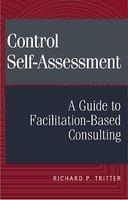 14.0%OFF
14.0%OFF

Download App
| >> | LShop | >> | Book | >> | Economics, Finance, ... | >> | Finance & Accounting | >> | Control Self-assessm... |
 14.0%OFF
14.0%OFF
Control Self-Assessment: A Guide to Facilitation-Based Consulting
-
ISBN
:
9780471298427
-
Publisher
:
John Wiley & Sons
-
Subject
:
Finance & Accounting
-
Binding
:
Hardcover
₹
10790.0
 14.0% OFF
14.0% OFF
₹
9279.0
Buy Now
Shipping charges are applicable for books below Rs. 101.0
View Details(Imported Edition) Estimated Shipping Time : 15-18 Business Days
View Details-
Description
Control Self-Assessment is a powerful audit and consulting tool that can be organized to protect against Business Risks or used as the central tool in a Business Process Analysis. In this first comprehensive introduction to CSA methodology, Richard Tritter explains how to successfully use CSA sessions to get a realistic look at the machinery of your business with information known to its day-to-day operational staff. He goes on to show you how to use this information to develop an action plan that will be enthusiastically put into practice. Control Self-Assessment is a must for any firm in which CEOs and staff share a common vision built on their collective wisdom.
-
Author Biography
RICHARD P. TRITTER is the Director of Regional Business Development at a major software consulting firm in Massachusetts. Previously, he was the Director of Facilitative Consulting and the Director of Business Self-Assessment practice worldwide at a Big Five accounting firm, which involved conducting facilitative meetings with groups of client executives at the vice-presidential level or higher. Regarded as a major authority on CSA technique, Tritter researched and wrote Control Self-Assessment: Experience, Current Thinking, and Best Practices for the Institute of Internal Auditors. For his facilitation work in improving adult-handicapped programs, the author was the cowinner of the Massachusetts Better Government Competition awarded by Governor William Weld in 1991.












 9279.0
9279.0










 0.0
0.0